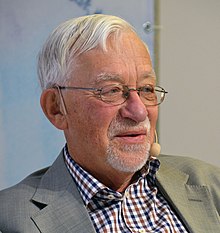Lars Gustafsson
| Lars Gustafsson | |
|---|---|

Lars Gustafsson in 2015
|
|
| Born |
17 May 1936 Västerås, Sweden |
| Died | 3 April 2016 (aged 79) , Sweden |
| Occupation | Writer |
Lars Erik Einar Gustavsson (17 May 1936 – 3 April 2016) was a Swedish poet, novelist, and scholar.
Gustafsson was born in Västerås, completed his secondary education at the Västerås Gymnasium and continued to Uppsala University; he received his licentiate degree in 1960 and was awarded his PhD in theoretical philosophy in 1978. He lived in Austin, Texas until 2003, and then returned to Sweden. From 1983 he served as a professor at the University of Texas at Austin, where he taught philosophy and creative writing, until May 2006, when he retired. In 1981 Gustafsson converted to Judaism.
Since the late 1950s he has produced poetry, novels, short stories, critical essays, and editorials. He gained international recognition as a Swedish writer with literary awards such as the Prix International Charles Veillon des Essais in 1983, the Heinrich Steffens Preis in 1986, Una Vita per la Litteratura in 1989, a John Simon Guggenheim Memorial Foundation Fellowship for poetry in 1994, and several others. He has been nominated for the Nobel Prize in Literature. His major works have been translated into fifteen languages, and Harold Bloom includes Gustafsson in The Western Canon: The Books and School of the Ages (1994).John Updike offered high praise for Gustafsson's The Death of a Beekeeper in his collection of criticism, Hugging The Shore.
The Death of a Beekeeper, written in 1978, is Gustafsson's most critically acclaimed and commercially successful novel. Eva Stenskaer has written that it "seems so effortless yet lyrical that only an artist at the height of his powers could've produced it." Its main theme is the agony of disease, as it follows Vesslan—a beekeeper who is dying of cancer—through entries he makes on notepads. The book's innovative structure allows Gustafsson to explore identity through its expression in a variety of forms: imagination, memory and even the mundane details of life. The book's central theme is revealed by the repeated motto of the protagonist, "We never give up. We begin anew."
...
Wikipedia
